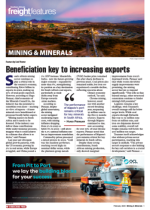South Africa’s rail freight sector has seen some signs of improvement, particularly in coal and iron ore exports, but overall tonnages remain well below target levels. While there are positive trends, experts remain sceptical about Transnet’s ability to meet its ambitious freight targets without greater private sector participation.According to the Minerals Council of SA, the ailing logistics network continues to be a major challenge for the mining sector. “The mining industry faces constrained rail and port logistics, high input costs for electricity and water, as well as increasing security concerns at mining operations and the products they mine,” said the council’s CEO Mzila Mthenjane.Some improvement has been seen in logistics over the past few months. Transnet Freight Rail railed more than 50 million tonnes of coal in 2024, up from 48 million tons the previous year. Iron ore exports also held steady, with total shipments ref lecting a more stable performance. However, despite these sector-specific gains, Transnet’s broader freight volumes continue to struggle.Transnet’s total freight performance remains well below historical levels. According to Hugo Pienaar, chief economist of the council, two financial years ago, total volumes were under 150 million tons, and while the current target has been set at 170 million tons, it is doubtful that this figure will be achieved. The long-term goal of 250 million tons appears increasingly difficult to attain without significant structural changes.There is clear consensus that this target cannot be reached without greater private sector participation. This has led to the introduction of private sector bidding for rail slots along key corridors – a development seen as critical for the future of South Africa’s logistics network.At the time of writing this article, the Transnet Rail Infrastructure Manager (Trim) had extended the closing date for slot applications to February 27,saying the decision had been taken in consultation and with the approval of the Interim Rail Economic Regulatory Capacity.According to Pienaar, the response from the private sector for these rail slots will be a key indicator of whether freight volumes can recover meaningfully. If successfully implemented, these partnerships could help alleviate inefficiencies, improve reliability and support the broader mining and export sectors.“However, the broader economic implications of Transnet’s financial struggles remain a pressing issue. The company requires at least R15 billion per year to restore and maintain the rail network, a sum it does not currently have. Treasury, facing fiscal constraints, has so far resisted direct bailouts, preferring to offer guarantees,” he said.It’s a “tough love” approach that continues to spark debate across the country. “The fundamental problem remains the state of the network,” said Pienaar. “Will private companies taking up rail slots be expected to operate on an ageing and deteriorating network, or will a compromise be reached where they contribute to its upgrade?”The question of how to finance and revitalise South Africa’s rail and freight infrastructure remains unresolved. Treasury’s position on supporting Transnet’s balance sheet will be pivotal in shaping the company’s future. As the country navigates its reform path, the challenge lies in striking a balance between financial discipline and the urgent need to restore its critical freight corridors. LV

